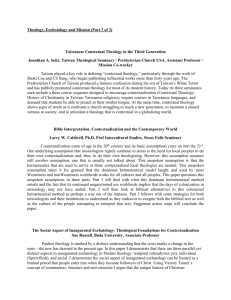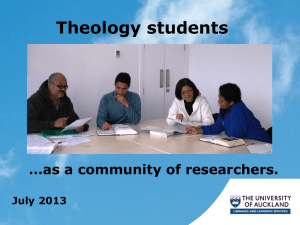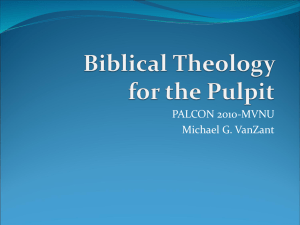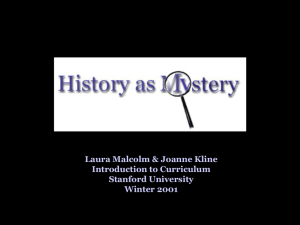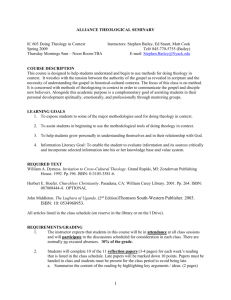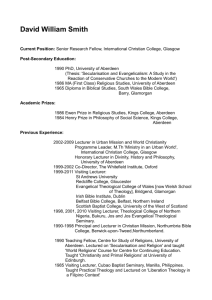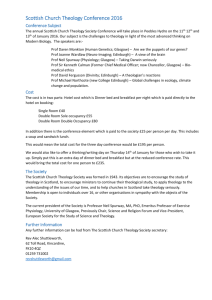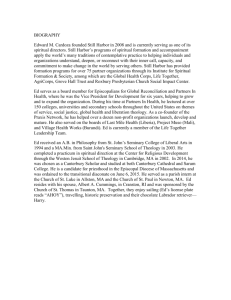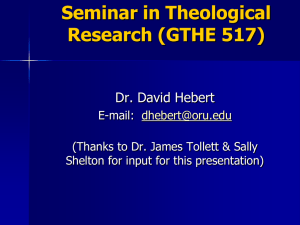Theology, Ecclesiology and Mission (Part 2 of 3)
advertisement
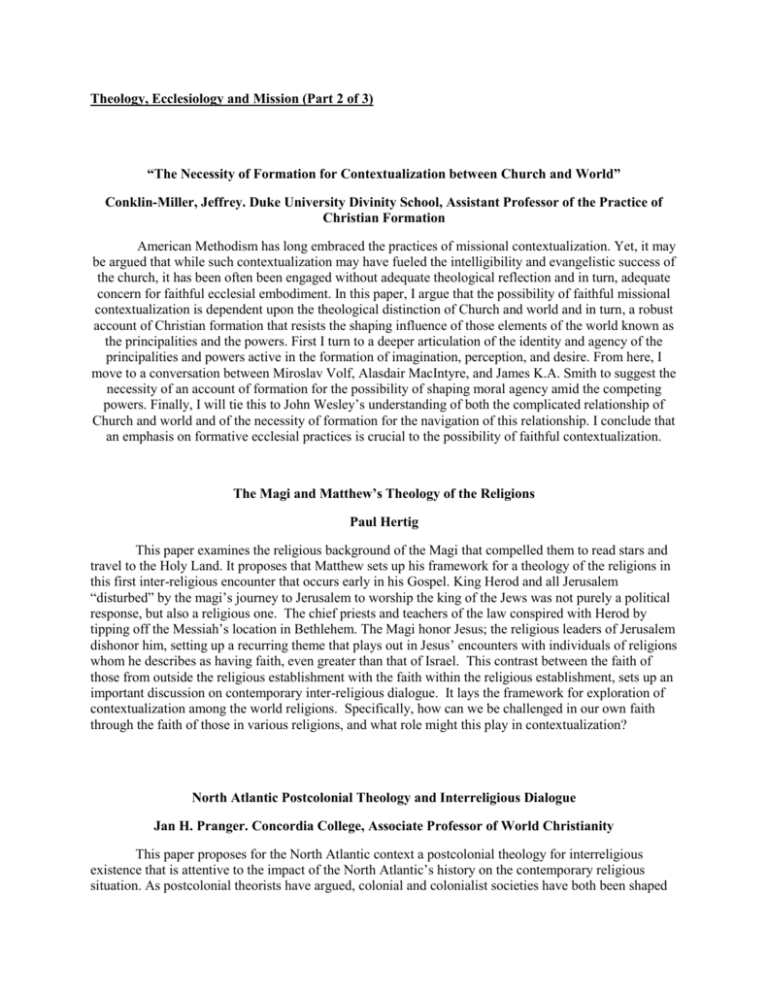
Theology, Ecclesiology and Mission (Part 2 of 3) “The Necessity of Formation for Contextualization between Church and World” Conklin-Miller, Jeffrey. Duke University Divinity School, Assistant Professor of the Practice of Christian Formation American Methodism has long embraced the practices of missional contextualization. Yet, it may be argued that while such contextualization may have fueled the intelligibility and evangelistic success of the church, it has been often been engaged without adequate theological reflection and in turn, adequate concern for faithful ecclesial embodiment. In this paper, I argue that the possibility of faithful missional contextualization is dependent upon the theological distinction of Church and world and in turn, a robust account of Christian formation that resists the shaping influence of those elements of the world known as the principalities and the powers. First I turn to a deeper articulation of the identity and agency of the principalities and powers active in the formation of imagination, perception, and desire. From here, I move to a conversation between Miroslav Volf, Alasdair MacIntyre, and James K.A. Smith to suggest the necessity of an account of formation for the possibility of shaping moral agency amid the competing powers. Finally, I will tie this to John Wesley’s understanding of both the complicated relationship of Church and world and of the necessity of formation for the navigation of this relationship. I conclude that an emphasis on formative ecclesial practices is crucial to the possibility of faithful contextualization. The Magi and Matthew’s Theology of the Religions Paul Hertig This paper examines the religious background of the Magi that compelled them to read stars and travel to the Holy Land. It proposes that Matthew sets up his framework for a theology of the religions in this first inter-religious encounter that occurs early in his Gospel. King Herod and all Jerusalem “disturbed” by the magi’s journey to Jerusalem to worship the king of the Jews was not purely a political response, but also a religious one. The chief priests and teachers of the law conspired with Herod by tipping off the Messiah’s location in Bethlehem. The Magi honor Jesus; the religious leaders of Jerusalem dishonor him, setting up a recurring theme that plays out in Jesus’ encounters with individuals of religions whom he describes as having faith, even greater than that of Israel. This contrast between the faith of those from outside the religious establishment with the faith within the religious establishment, sets up an important discussion on contemporary inter-religious dialogue. It lays the framework for exploration of contextualization among the world religions. Specifically, how can we be challenged in our own faith through the faith of those in various religions, and what role might this play in contextualization? North Atlantic Postcolonial Theology and Interreligious Dialogue Jan H. Pranger. Concordia College, Associate Professor of World Christianity This paper proposes for the North Atlantic context a postcolonial theology for interreligious existence that is attentive to the impact of the North Atlantic’s history on the contemporary religious situation. As postcolonial theorists have argued, colonial and colonialist societies have both been shaped by colonialism, which especially includes theological understandings of religious others. Colonialist theological constructions of North Atlantic selves and colonial (religious) others not only provided ideological support for North Atlantic colonialism. Christian theology itself has often been ‘colonialist’ in at least a metaphorical sense. Just as settler colonialism sought to replace the native population, much of colonial Christian missions sought to replace indigenous religions based upon transcendent claims that cast theological judgment on other religions without considering the possibility of God’s providential and graceful relationship to those religions. Postcolonial North Atlantic theology must seek to overcome this continuing legacy by proposing theologies that seek reconciliation with religious others. This paper contributes to such reconciled interfaith existence by proposing an inclusivist yet de-centered Christian theology that explores God’s Otherness and God’s Love for otherness as way to decolonize North Atlantic Christianity’s relationships with religious others, and discussing the implications of this theology for Christian understandings of mission and dialogue. An Ethnoecclesio Turn: On The Dynamic Relation Between Ecclesiality and Locality of the Church Pascal D. Bazzell, Postdoc. Fell., Swiss Nat’l. Sc. Fnd., Humboldt U/OMF This essay explores the methodological divide between the study of the church from a Platonic (idealist) philosophy and an Aristotelian (realist) philosophy. Classical ecclesiology whose influences have been more an idealistic approach are generally concerned with the “deep-level” meaning of the essence of the Church. The focus is on theological understanding of the church - e.g., images of the Church, marks of the Church, etc., which may tend to draw conclusions using ideal abstractions from its concrete ecclesial reality. Alternatively, congregational studies whose influences are more a realistic approach focus on the ecclesiastics of the church, which may yield a more “surface-level” meaning of the essence of the Church. In this essay, I further develop an ethnoecclesio hermeneutic that embraces the dynamic relationship of ecclesiality (ideal ecclesiology) and contextuality (local ecclesiology) of the Church that are closely interrelated. As ubi Christus - ibi ecclesia is central to this dynamic relationship; a triangular hermeneutical space is defined by virtue of Christ’s identifying assurance of his presence in the Church, among the poor, and in his parousia. Being attentive to the narrative at the margins, an ethnoecclesio hermeneutic articulates an ecclesial ethnography of a robust corrective to ‘blue-print ecclesiology’ (Healy); while at the same time contributes an idealistic perspective to the study of the visible ecclesial gathering addressing the empirical Church. To illustrate this ecclesiological framework, I then proceed to re-reading the marks of the Church through the lens of the “preferential option of the poor” developed by the global South. In this way a more appropriate ecclesiology may emerge in order to deepen the ecumenical understanding of today’s ecclesial reality. ASM Series—Publication Progress Report: Case Studies in Incarnational Mission (Dan Shaw/Bill Burrows) R. Daniel Shaw NOT FOUND

